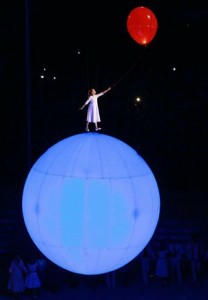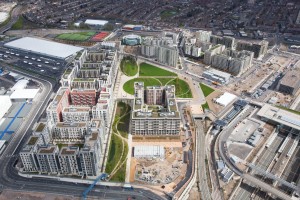The uses of the past at the Olympics
14 February 2014 – Richard Anderson

Eleven-year-old Liza Temnikova, as the character of Lubov (the Russian word for “love) during the opening ceremonies of the 2014 Winter Olympics in Sochi. The ceremony, titled “Dreams of Russia,” was meant to evoke a child’s dream-like journey across her country’s landscape and history. Photo credit: www.kremlin.ru
I am a sucker for the drama of the Olympics. Yet while watching the ongoing Winter Games in Sochi, Russia, I have been struck once again by the continuous invocation of the past during the Olympics and–at the same time–the limited historical consciousness exhibited by the International Olympic Committee, national organizing bodies, corporate sponsors, and host cities. The Olympics cry out for the interpretive and presentational tools of public history. We should recognize and resist the tendency of the Olympics to mine collective identity, commemorative ritual, and public memory for national glory and material gain.
The Games make claims about the past on several levels. The ritual spectacle of the opening ceremony exemplifies the way countries use the Olympics to cultivate national pride and assert cultural distinctiveness. Cathy Stanton observed in History@Work that London’s opening ceremony for the 2012 Summer Games harkened back to the epic pageants of the early twentieth century as it narrated signal events in British history, from the Industrial Revolution to the founding of the National Health Service. The representation of factory owners interacting with happy workers betrayed the ideological assumptions about national unity embedded in the ceremony.
The pageant that opened the Sochi Games was no different. A brief introductory video presented all of Russian history as leading up to that evening’s ceremony, while the live performance interpreted points of historical pride–the reign of Peter the Great, Tolstoy’s War and Peace, the Russian Revolution–through music and interpretive dance. Beyond the ceremony itself, the eagerness of NBC broadcasters Meredith Vieira and Matt Lauer to question the political motives of the performance and to detect the dark hand of Vladimir Putin behind the proceedings departed starkly from their standard credulousness about all things Olympic. Combined with the facile guest commentary of David Remnick, the New Yorker editor and Russia “expert,” NBC’s coverage betrayed a creeping nationalism of its own. I find it difficult to imagine Vieira and Lauer offering similarly jaundiced observations about an Olympic ceremony on US soil.
The historically rooted nationalism of the Olympics occupies a spectrum from malignant to corny to inspiring. More consistently troubling are the ways the contemporary Olympic Games employ a historical tradition of amateurism to shroud a contemporary record of labor exploitation and corporate profit-seeking. (Recall that Mitt Romney elevated his national profile by “rescuing” the scandal-plagued 2002 Winter Games in Salt Lake City.) Like major college football and basketball, today’s Olympics allow nearly everyone but the athletes to rake in money. The staggering cost of corporate sponsorship and television rights illustrates the Olympics’ commodification of putatively pure amateur competition.
The nonstop Olympic media blitz lasts only sixteen days, but the Games leave a permanent legacy in the built environment of host cities. In the realm of urban policy, the commercializing tendencies of the Olympics and the imperatives of global capitalism combine to unmoor communities from their pasts. Organizers and real estate boosters tout the Games as a vehicle for economic revitalization of the host city. Unfortunately, the building boom accompanying the Olympics often displaces longtime residents and despoils historic districts, as demonstrated by the 2008 Beijing Games.

The Olympic Village for the London Summer Games rises against the backdrop of the city’s working-class East End in April 2012. Photo Credit: EG Focus
The implications of the Olympic Games for urban space first became clear to me in the winter of 2011 during a walking tour of London’s unfinished Olympic site. The physical, social, and economic changes wrought by the Olympics were already evident as we walked through the city’s formerly industrial East End neighborhood, long home to the city’s poor and immigrant communities. Dilapidated public housing complexes stood in the shadow of quickly rising apartment buildings that promised to bring an influx of middle-class professionals. In April 2012 local officials responded to the sudden dearth of affordable flats in the East End by proposing to relocate residents on a waiting list for public housing to the depressed northern city of Stoke-on-Trent. As we walked past canals containing stagnant water and receding memories of the neighborhood’s past as shipping hub, our very pleasant tour guide described the East End as a “dump” and stressed that prior to the Olympics “nobody lived here.” I wondered how several pedestrians within earshot greeted her words, which emblemized the attitude of urban redevelopment advocates toward the people in their path.
The British government promised that the Olympics would provide 20,000 jobs for local residents and that the sporting venues and infrastructure upgrades would be a boon to the East End. Despite a record of broken promises, it is too early to fully assess the impact of the London Games, let alone the Sochi Games, on local residents. But the examples of Montreal, Athens, Atlanta, and other cities are far from encouraging. Recent protests across Brazil in response to urban redevelopment and mass displacement ahead of this summer’s World Cup and the 2016 Summer Games in Rio suggest a growing skepticism among ordinary citizens toward the grand visions of Olympic organizers. I would love to see the extraordinary public mobilization against Russia’s repression of homosexuals morph into a more general scrutiny of the public policies that accompany the Games.
The Olympics offer a rich transnational lens through which to investigate the questions of identity, commemorative ritual, and public memory that are central to our discipline. The Games also offer public historians the opportunity to critically engage with planners, public officials, and local communities in future Olympic cities to make subsequent Games less destructive to the built environment and social structure. (It is probably too much to hope for a less crassly commercial Olympics.) Pop-up museums, walking tours, and other street-level programming during the Games could offer alternative narratives of the city’s past and present while countering the simplistic narratives of economic-development-equals-social-progress. Public historians could also collaborate with residents to document contemporary dislocations, providing the raw material for future scholarship. I will leave you with an impressive example of a documentary project that examines the impact of the Olympics.
~ Richard Anderson is a doctoral student in twentieth-century American history at Princeton University.




hi i am here to talk to Liza may i please